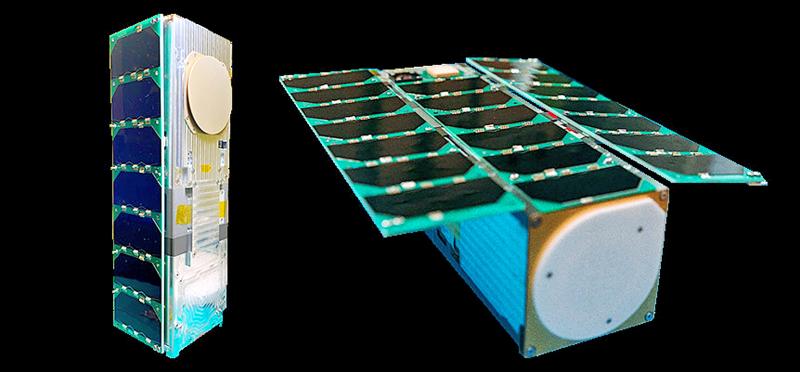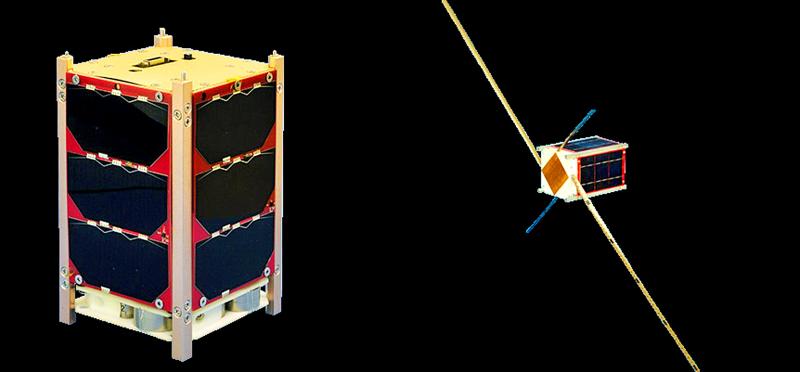The local research teams that developed two cubesats launched by a Space Exploration Technologies Corp’s (SpaceX) Falcon 9 rocket at 11pm on Sunday are dealing with signal reception problems at their ground stations.
The Transporter-1 mission launched 143 satellites — the most ever deployed on a single mission — from the Cape Canaveral Space Force Station in Florida, after being delayed three times due to technical problems or unfavorable weather.
Taiwan’s two cubesats are the YuSat, designed to monitor road and maritime traffic, and the Ionospheric Dynamics Explorer and Attitude Subsystem Satellite (IDEASSat), designed for ionospheric observation.

Photo courtesy of the National Space Organization
By noon yesterday, the two teams had not succeeded in communicating with the cubesats from the ground stations at the National Space Organization (NSPO), National Central University (NCU) and National Taiwan Ocean University (NTOU).
However, some overseas amateur radio operators did receive signals transmitted by the two cubesats with corresponding signal frequencies, intervals and coordinates, said NCU Department of Space Science and Engineering professor Loren Chang (張起維), who oversees the IDEASSat project.
That shows the two cubesats are operating, Chang said, adding that researchers would continue to work on solving the signal reception problems.

Photo courtesy of the National Space Organization
The NSPO and the teams were yesterday planning to communicate with the cubesats at about 8:30pm as they passed above Taiwan again, the Ministry of Science and Technology said in a news release yesterday afternoon.
While the cubesats are at their designated orbit of 525km above the Earth, it would take some time for them to rotate to their correct orientation, said NTOU associate professor Kao Sheng-long (高聖龍), who oversees the YuSat project.
Kao said that it might take another week or even a month to sort out the signal reception problem, but he is not that worried, because it is a normal phenomenon of scientific research and development.
Despite the small setback, the successful launch has been a boost for NCU teachers and students, who gathered at the school on Saturday and Sunday night to watch a livestream of the launch.
NCU first-year students surnamed Wang (王) and Lai (賴) on Sunday said that they were excited to join senior students and teachers in watching the launch, adding that they have to improve their knowledge of physics, calculus and system engineering if they want to be involved in satellite development.

A magnitude 7.0 earthquake struck off Yilan at 11:05pm yesterday, the Central Weather Administration (CWA) said. The epicenter was located at sea, about 32.3km east of Yilan County Hall, at a depth of 72.8km, CWA data showed There were no immediate reports of damage. The intensity of the quake, which gauges the actual effect of a seismic event, measured 4 in Yilan County area on Taiwan’s seven-tier intensity scale, the data showed. It measured 4 in other parts of eastern, northern and central Taiwan as well as Tainan, and 3 in Kaohsiung and Pingtung County, and 2 in Lienchiang and Penghu counties and 1

FOREIGN INTERFERENCE: Beijing would likely intensify public opinion warfare in next year’s local elections to prevent Lai from getting re-elected, the ‘Yomiuri Shimbun’ said Internal documents from a Chinese artificial intelligence (AI) company indicated that China has been using the technology to intervene in foreign elections, including propaganda targeting Taiwan’s local elections next year and presidential elections in 2028, a Japanese newspaper reported yesterday. The Institute of National Security of Vanderbilt University obtained nearly 400 pages of documents from GoLaxy, a company with ties to the Chinese government, and found evidence that it had apparently deployed sophisticated, AI-driven propaganda campaigns in Hong Kong and Taiwan to shape public opinion, the Yomiuri Shimbun reported. GoLaxy provides insights, situation analysis and public opinion-shaping technology by conducting network surveillance

‘POLITICAL GAME’: DPP lawmakers said the motion would not meet the legislative threshold needed, and accused the KMT and the TPP of trivializing the Constitution The Legislative Yuan yesterday approved a motion to initiate impeachment proceedings against President William Lai (賴清德), saying he had undermined Taiwan’s constitutional order and democracy. The motion was approved 61-50 by lawmakers from the main opposition Chinese Nationalist Party (KMT) and the smaller Taiwan People’s Party (TPP), who together hold a legislative majority. Under the motion, a roll call vote for impeachment would be held on May 19 next year, after various hearings are held and Lai is given the chance to defend himself. The move came after Lai on Monday last week did not promulgate an amendment passed by the legislature that

AFTERMATH: The Taipei City Government said it received 39 minor incident reports including gas leaks, water leaks and outages, and a damaged traffic signal A magnitude 7.0 earthquake struck off Taiwan’s northeastern coast late on Saturday, producing only two major aftershocks as of yesterday noon, the Central Weather Administration (CWA) said. The limited aftershocks contrast with last year’s major earthquake in Hualien County, as Saturday’s earthquake occurred at a greater depth in a subduction zone. Saturday’s earthquake struck at 11:05pm, with its hypocenter about 32.3km east of Yilan County Hall, at a depth of 72.8km. Shaking was felt in 17 administrative regions north of Tainan and in eastern Taiwan, reaching intensity level 4 on Taiwan’s seven-tier seismic scale, the CWA said. In Hualien, the